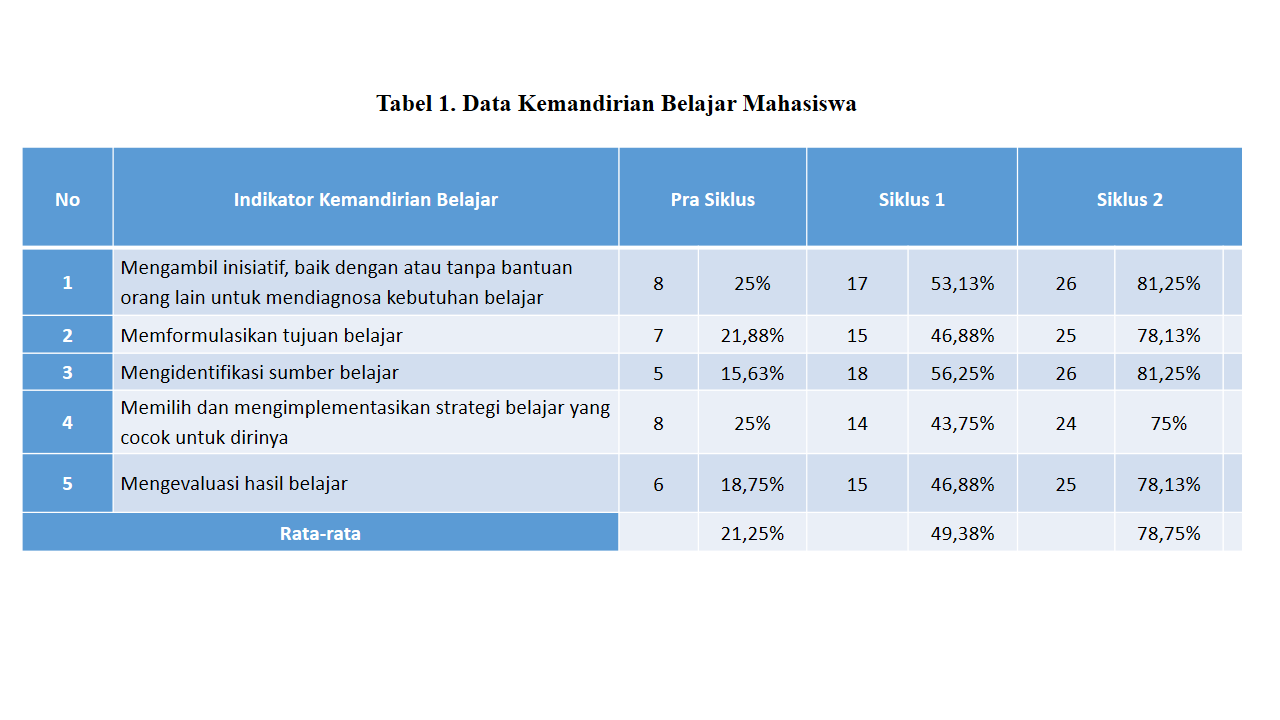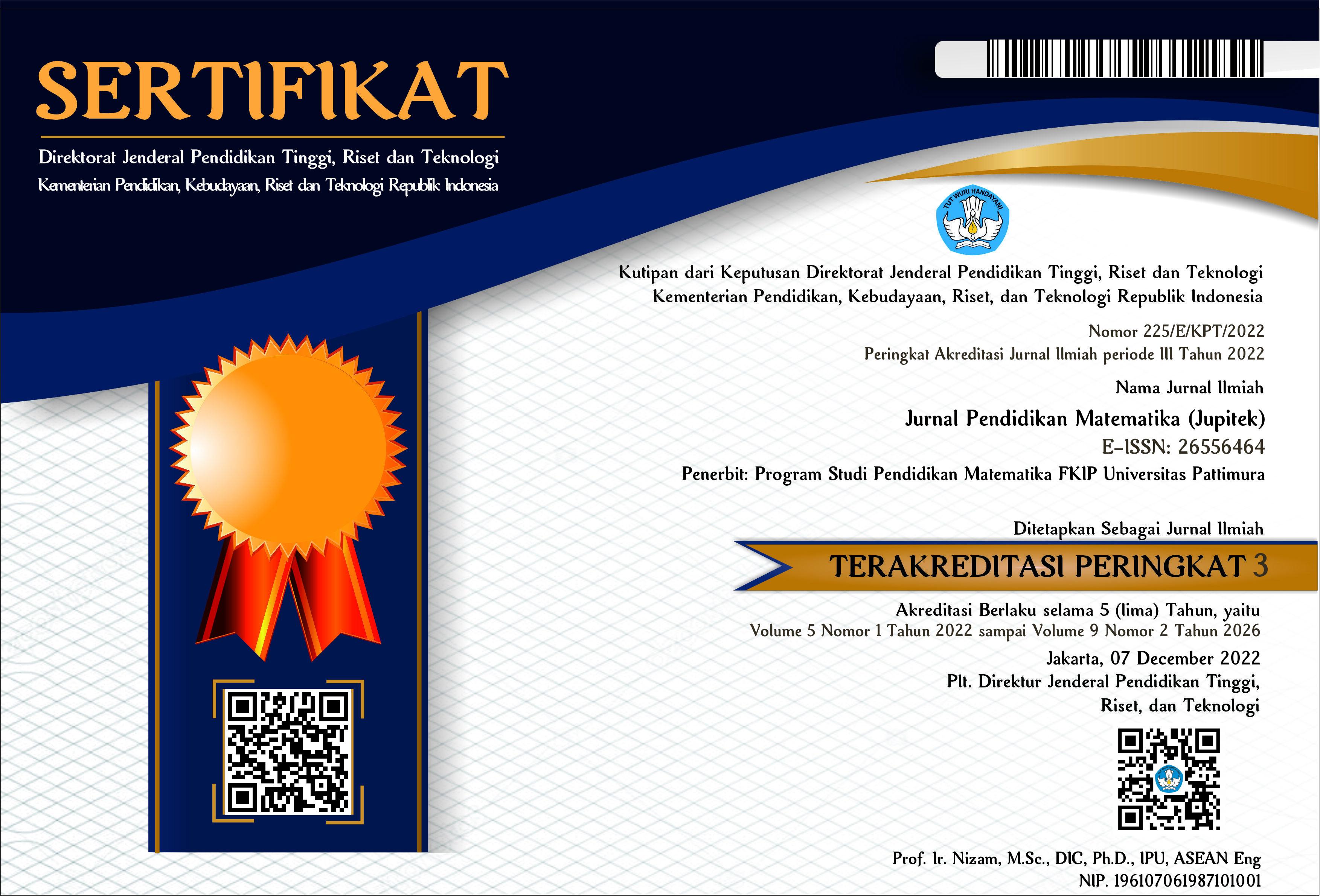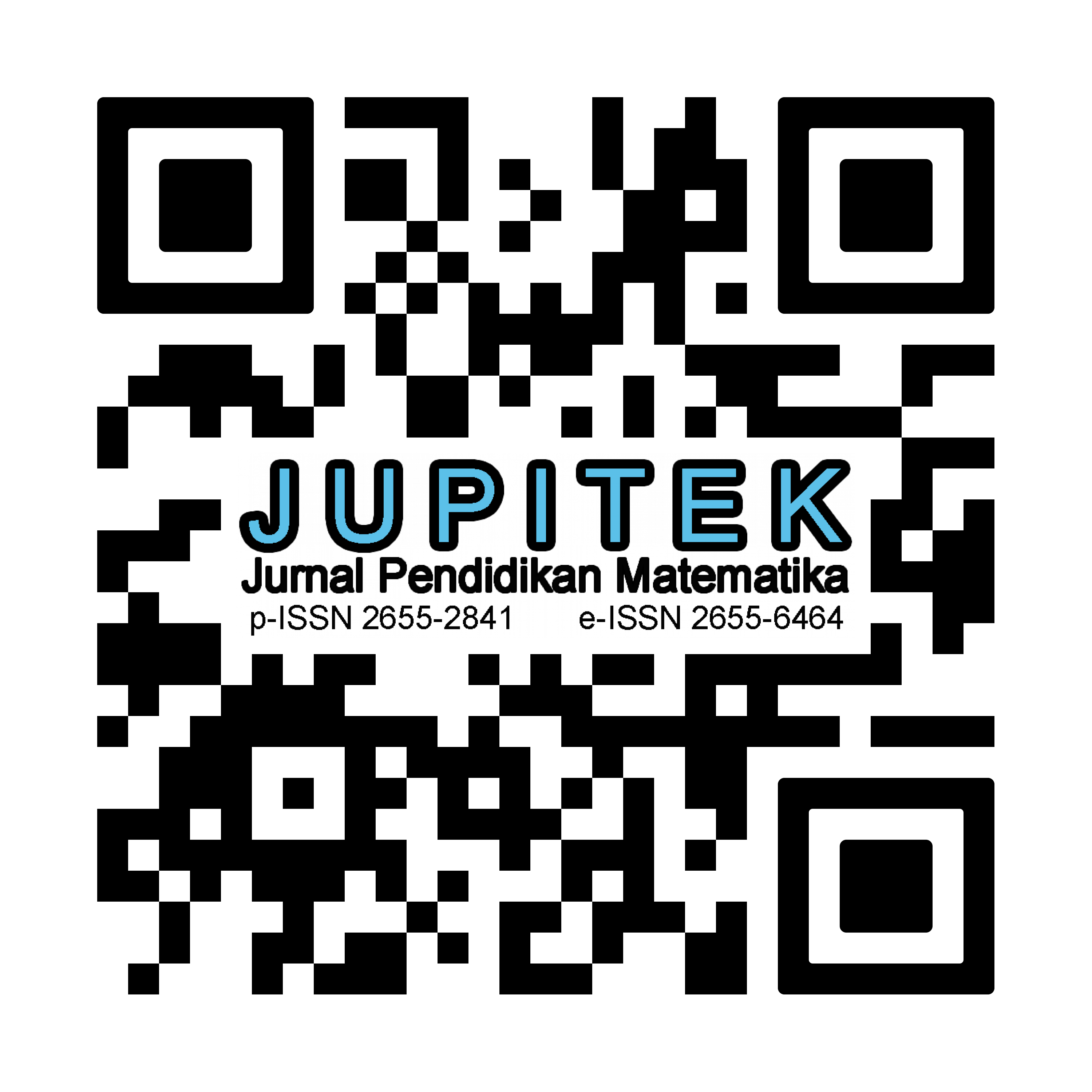IMPLEMENTASI BLENDED LEARNING UNTUK MENINGKATKAN KEMANDIRIAN BELAJAR MAHASISWA
Abstract
The purpose of this research is to know the improvement of student learning independence through the implementation of blended learning. The subject in this study were students of the Department of Mathematics Education, Musamus University, who took the differential equations course as many as 32 students. This classroom action research uses a Kemmis & Mc Taggart class action research cycle which is carried out in 2 cycles. Data collection techniques used in the form of documentation, observation and interviews. The documentation used are list of grades task and midterm exams, to measure student learning independence used learning independence observation sheet, as well as to determine student responses to implementation of learning using the interview method. Based on the analysis of the data obtained, the implementation of blended learning is able to increase student independence as evidenced by the results obtained there is an increase in the number of students who have learning independence. Pre-cycle learning independence data showed that 21.35% of students had aspects of learning independence, after the implementation of blended learning, the results in cycle 1 increased to 49.38% of students, and increased again in cycle 2 to 78.75% of students. With the implementation of blended learning, it is also able to improve student achievement as indicated by student achievement data. In cycle 1, the number of students who graduated was 46.88%, and increased in the implementation of cycle 2 to 71.88%
Downloads
References
Anhusadar, L. (2020). Persepsi Mahasiswa PIAUD terhadap Kuliah Online di Masa Pandemi Covid 19. KINDERGARTEN: Journal of Islamic Early Childhood Education, 3(1), 44–58. https://doi.org/10.24014/kjiece.v3i1.9609
Ekayanti, R. (2017). Optimalisasi Aplikasi Edmodo dalam Meningkatkan Kemandirian Belajar dan Kesadaran Berbahasa Mahasiswa pada Mata Kuliah Literary Criticism Di FKIP UMSU. Jurnal EduTech, 3(1), 148–165.
Fitriasari, P., Tanzimah, & Sari, N. (2018). Kemandirian Belajar Mahasiswa Melalui Blended Learning Pada Mata Kuliah Metode Numerik. Jurnal Elemen, 4(1), 1–8. https://doi.org/10.32505/v3i2.1367
Ismaniati, C., Sungkono, & Wahyuningsih, D. (2015). Model Blended Learning untuk Meningkatkan Kemandirian Belajar dan Daya Tarik dalam Perkuliahan. Jurnal Penelitian Ilmu Pendidikan, 8(2), 19–27.
Lestari, N., & Suryani, D. R. (2019). Penggunaan Variasi Media Pembelajaran untuk Meningkatkan Motivasi dan Minat Belajar Matematika Siswa Kelas XI IPS 3 SMA Negeri 2 Merauke. Musamus Journal Of Mathematics Education, 1(2), 74–79.
Nurhayati, Suryani, D. R., & Nur’aini, K. D. (2021). The Effect of Blended Learning on Students’ amethematical Proving Ability. Proceedings of The International Joined Conference on Social Science (ICSS 2021), 603, 438–440. https://www.atlantis-press.com/proceedings/icss-21/125965154
Rahmi, U. (2018). Desain Sistem Pembelajaran Blended Learning : Upaya Peningkatan Kualitas Pendidikan Di Indonesia. 122–137. https://doi.org/10.31227/osf.io/j84c3
Sari, A. R. (2013). Strategi Blended Learning Untuk Peningkatan Kemandirian Belajar Dan Kemampuan Critical Thinking Mahasiswa Di Era Digital. Jurnal Pendidikan Akuntansi Indonesia, 11(2), 32–43. https://doi.org/10.21831/jpai.v11i2.1689
Sari, M., & Asmendri. (2019). Analisis Model-Model Blended Learning di Lembaga Pendidikan. NATURAL SCIENCE: Jurnal Pendidikan IPA Dan Pendidikan IPA, 5(2), 835–847.
Suhartini, A. S., Meirista, E., & Nur’aini, K. D. (2018). Pengaruh Penggunaan Gadget Terhadap Kemandirian Mahasiswa Pendidikan Matematika Universitas Musamus. Musamus Journal of Mathematics Education, 1(1), 43–51

Copyright (c) 2021 Dessy Rizki Suryani

This work is licensed under a Creative Commons Attribution-NonCommercial-ShareAlike 4.0 International License.
License and Copyright Agreement
By submitting a manuscript to Jurnal Pendidikan Matematika (JUPITEK), the author(s) certify and agree to the following terms:
- Originality and Authority: The submitting author is authorized by all co-authors to enter into this agreement. The manuscript describes original work that has not been published previously in a peer-reviewed journal, nor is it under consideration for publication elsewhere.
- Approval: Its publication has been approved by all author(s) and by the responsible authorities of the institutions where the work was carried out.
- Rights: The authors secure the right to reproduce any material that has already been published or copyrighted elsewhere.
- Licensing and Copyright: Authors retain the copyright to their work.
- License Grant: The authors grant Jurnal Pendidikan Matematika (JUPITEK) the right of first publication, with the work simultaneously licensed under the Creative Commons Attribution-NonCommercial-ShareAlike 4.0 International (CC BY-NC-SA 4.0).
- Self-Archiving: Authors are permitted and encouraged to deposit the published version of their article in institutional repositories, on their personal websites, and other academic platforms, with proper acknowledgment of its initial publication in Jurnal Pendidikan Matematika (JUPITEK).





.png)


